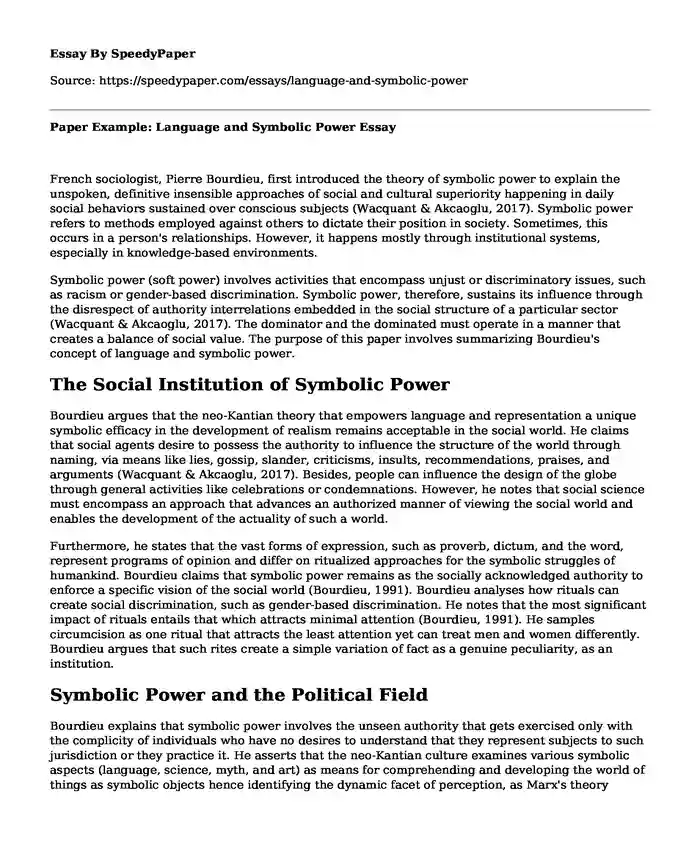
| Essay type: | Definition essays |
| Categories: | Discrimination Public relations Social issue |
| Pages: | 3 |
| Wordcount: | 732 words |
French sociologist, Pierre Bourdieu, first introduced the theory of symbolic power to explain the unspoken, definitive insensible approaches of social and cultural superiority happening in daily social behaviors sustained over conscious subjects (Wacquant & Akcaoglu, 2017). Symbolic power refers to methods employed against others to dictate their position in society. Sometimes, this occurs in a person's relationships. However, it happens mostly through institutional systems, especially in knowledge-based environments.
Symbolic power (soft power) involves activities that encompass unjust or discriminatory issues, such as racism or gender-based discrimination. Symbolic power, therefore, sustains its influence through the disrespect of authority interrelations embedded in the social structure of a particular sector (Wacquant & Akcaoglu, 2017). The dominator and the dominated must operate in a manner that creates a balance of social value. The purpose of this paper involves summarizing Bourdieu's concept of language and symbolic power.
The Social Institution of Symbolic Power
Bourdieu argues that the neo-Kantian theory that empowers language and representation a unique symbolic efficacy in the development of realism remains acceptable in the social world. He claims that social agents desire to possess the authority to influence the structure of the world through naming, via means like lies, gossip, slander, criticisms, insults, recommendations, praises, and arguments (Wacquant & Akcaoglu, 2017). Besides, people can influence the design of the globe through general activities like celebrations or condemnations. However, he notes that social science must encompass an approach that advances an authorized manner of viewing the social world and enables the development of the actuality of such a world.
Furthermore, he states that the vast forms of expression, such as proverb, dictum, and the word, represent programs of opinion and differ on ritualized approaches for the symbolic struggles of humankind. Bourdieu claims that symbolic power remains as the socially acknowledged authority to enforce a specific vision of the social world (Bourdieu, 1991). Bourdieu analyses how rituals can create social discrimination, such as gender-based discrimination. He notes that the most significant impact of rituals entails that which attracts minimal attention (Bourdieu, 1991). He samples circumcision as one ritual that attracts the least attention yet can treat men and women differently. Bourdieu argues that such rites create a simple variation of fact as a genuine peculiarity, as an institution.
Symbolic Power and the Political Field
Bourdieu explains that symbolic power involves the unseen authority that gets exercised only with the complicity of individuals who have no desires to understand that they represent subjects to such jurisdiction or they practice it. He asserts that the neo-Kantian culture examines various symbolic aspects (language, science, myth, and art) as means for comprehending and developing the world of things as symbolic objects hence identifying the dynamic facet of perception, as Marx's theory argues (Bourdieu, 1991). Bourdieu argues that cultural aspects remain superior to financial factors in establishing the pyramid of authority and its introduction within societies.
Besides, he acknowledges that economic resources and social status remain vital in the sustenance of dominance in an arrangement, instead of possession over the chain of production only (Bourdieu, 1991). The perception that an individual could own symbolic resources besides and include economic resources formed the basis of Bourdieu's assessment of power hierarchy.
Bourdieu argues that the cultural and linguistic generation of subjugated people differs considerably conferring to their orientation and their ability to gain from the controlled freedoms provided by free markets or to agree to endure the restrictions enforced by prevailing markets (Bourdieu, 1991). He asserts that in the polymorphous integrity which a person realizes by assessing all the speech types generated for all the demands by the entire group of producers. Those who have the conviction that they have the responsibility to champion for the rights of others may get objective support for their mission or dream.
Conclusion
The idea of symbolic power may have its origin in Friedrich Engel's theory of false awareness, in which subjects and social relations under capitalism get encompassed in societal value that relies on the players who involve in dealings themselves. With the absence of fantasies of natural laws regulating such transactions of physical and social value, the masses can remain reluctant to upkeep social relationships that frustrate their welfare knowingly.
References
Bourdieu, P. (1991). Language and symbolic power. Harvard University Press. www.books.google.com/books?
Wacquant, L., & Akcaoglu, A. (2017). Practice and symbolic power in Bourdieu: The view from Berkeley. Journal of Classical Sociology, 17(1), 55-69. www.journals.sagepub.com/doi/abs/10.1177/1468795X16682145
Cite this page
Paper Example: Language and Symbolic Power. (2023, Jul 30). Retrieved from https://speedypaper.net/essays/language-and-symbolic-power
Request Removal
If you are the original author of this essay and no longer wish to have it published on the SpeedyPaper website, please click below to request its removal:
- Free Essay: Should America Continue to Commemorate Its Confederate Past in Form of Public Statues
- Free Essay on Creating an Action Plan to Reduce Discrimination and Prejudice among LGBT Students
- Paper Example. "There Is No Children Here"
- Essay Sample on Homelessness and Poverty
- Free Essay Example on Debate About Income Tax Returns
- Why Is the Black Race Impoverished? Essay Example
- Ways in which Teachers can Embrace diversity in the United States - Paper Example
Popular categories




